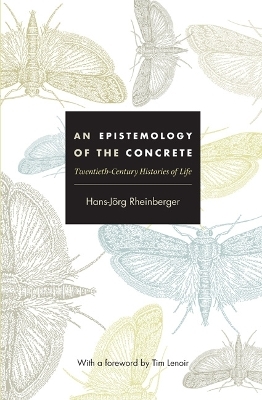
An Epistemology of the Concrete
Duke University Press (Verlag)
978-0-8223-4575-6 (ISBN)
An Epistemology of the Concrete brings together case studies and theoretical reflections on the history and epistemology of the life sciences by Hans-Jörg Rheinberger, one of the world’s foremost philosophers of science. In these essays, he examines the history of experiments, concepts, model organisms, instruments, and the gamut of epistemological, institutional, political, and social factors that determine the actual course of the development of knowledge. Building on ideas from his influential book Toward a History of Epistemic Things, Rheinberger first considers ways of historicizing scientific knowledge, and then explores different configurations of genetic experimentation in the first half of the twentieth century and the interaction between apparatuses, experiments, and concept formation in molecular biology in the second half of the twentieth century. He delves into fundamental epistemological issues bearing on the relationship between instruments and objects of knowledge, laboratory preparations as a special class of epistemic objects, and the note-taking and write-up techniques used in research labs. He takes up topics ranging from the French “historical epistemologists” Gaston Bachelard and Georges Canguilhem to the liquid scintillation counter, a radioactivity measuring device that became a crucial tool for molecular biology and biomedicine in the 1960s and 1970s. Throughout An Epistemology of the Concrete, Rheinberger shows how assemblages—historical conjunctures—set the conditions for the emergence of epistemic novelty, and he conveys the fascination of scientific things: those organisms, spaces, apparatuses, and techniques that are transformed by research and that transform research in turn.
Hans-Jörg Rheinberger is Director at the Max Planck Institute for the History of Science, Berlin. He is the author of On Historicizing Epistemology: An Essay and Toward a History of Epistemic Things: Synthesizing Proteins in the Test Tube.
Illustrations vii
Foreword / Tim Lenoir xi
Prologue 1
Part I. Historical Epistemology
1. Ludwik Fleck, Edmond Husserl: On the Historicity of Scientific Knowledge 13
2. Gaston Bachelard: The Concept of "Phenomenotechnique" 25
3. Georges Canguilhem: Epistemological History 37
Part II. Model Organisms: Studies in the History of Heredity and Reproduction
4. Pisum: Carl Carren's Experiments on Xenia, 1896–99 51
5. Eudorina: Max Hartmann's Experiments on Biological Regulation in Protozoa, 1914–21 82
6. Ephistia: Alfred Kühn's Experimental Design for a Developmental Physiological Genetics, 1924–45 94
7. Tobacco Mosaic Virus: Virus Research at the Kaiser Wilhelm Institutes for Biochemistry and Biology, 1937–45 128
Part III. Concepts and Instruments: Studies in the History of Molecular Biology
8. The Concept of the Gene: Molecular Biological Perspectives 153
9. The Liquid Scintillation Counter: Traces of Radioactivity 170
10. The Concept of Information 203
Part IV. Epistemic Configurations
11. Intersections 217
12. Preparations 233
13. The Economy of the Scribble 244
Acknowledgments 253
Abbreviations 255
Notes 257
Bibliography 289
Index 321
| Zusatzinfo | 43 illustrations, 2 tables |
|---|---|
| Verlagsort | North Carolina |
| Sprache | englisch |
| Maße | 156 x 235 mm |
| Gewicht | 494 g |
| Themenwelt | Geisteswissenschaften ► Philosophie ► Erkenntnistheorie / Wissenschaftstheorie |
| Naturwissenschaften | |
| ISBN-10 | 0-8223-4575-7 / 0822345757 |
| ISBN-13 | 978-0-8223-4575-6 / 9780822345756 |
| Zustand | Neuware |
| Haben Sie eine Frage zum Produkt? |
aus dem Bereich

![Was heißt Denken?. Vorlesung Wintersemester 1951/52. [Was bedeutet das alles?] - Martin Heidegger](/media/113619842)
